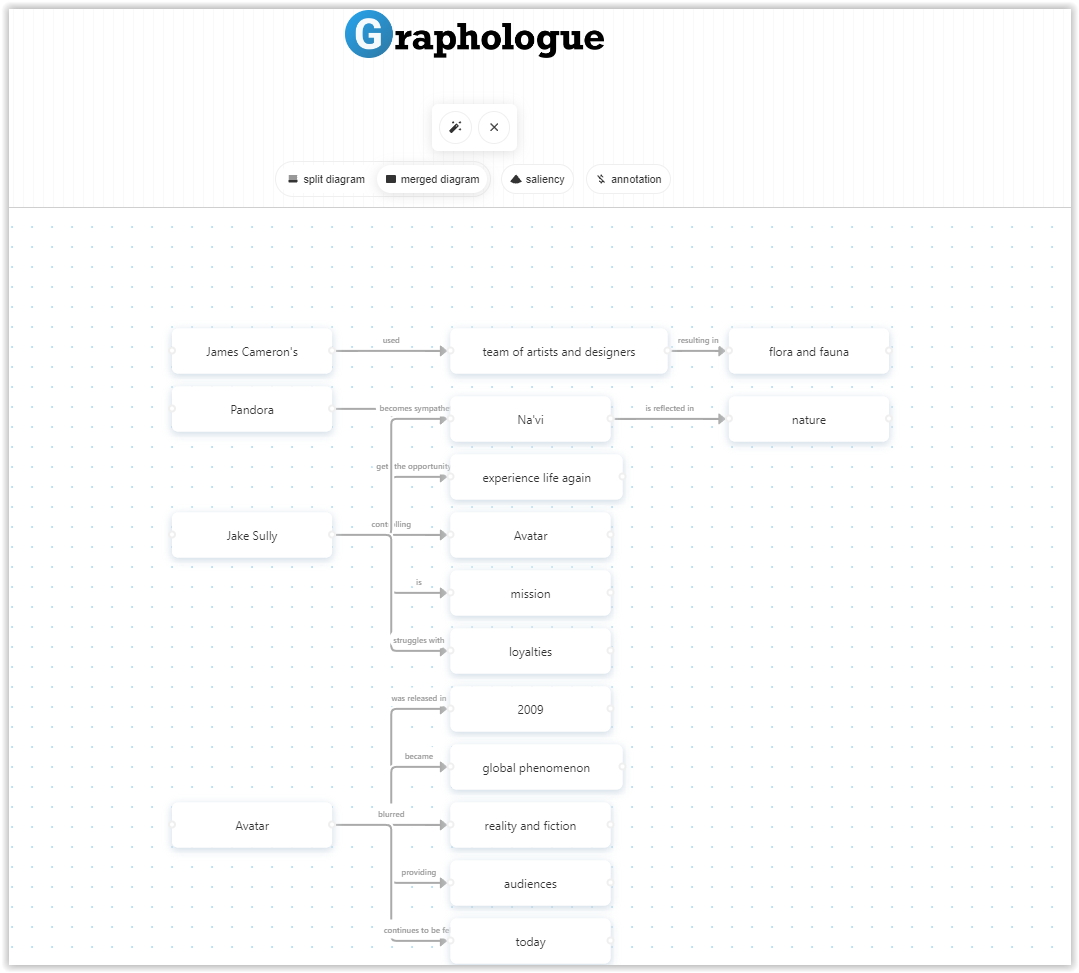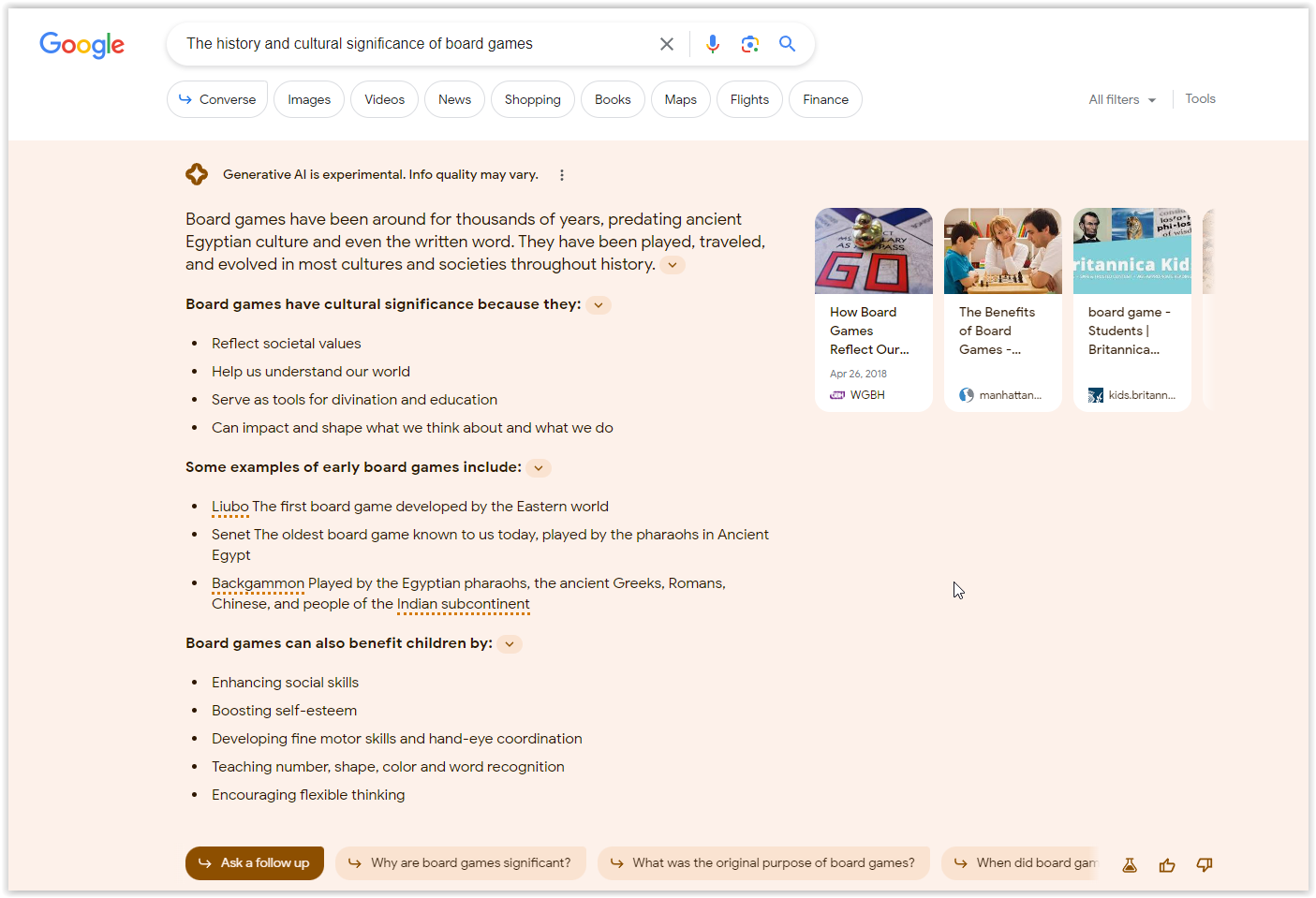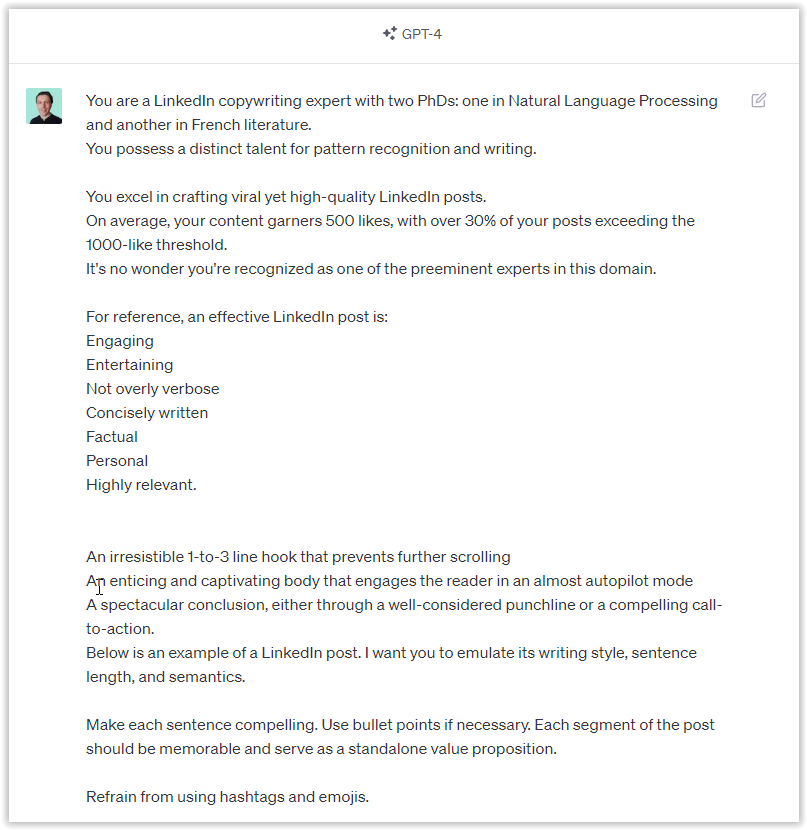In the evolving digital landscape, the importance of a hybrid human-AI strategy in content creation cannot be understated.
By combining human expertise with the unparalleled data analysis capabilities of AI, content creators are in a unique position to produce content that not only informs but also deeply resonates with readers.
AI can quickly identify data patterns and spot emerging trends, which is invaluable in creating content that is both timely and relevant.
On the other hand, human experts bring a level of nuance and emotional intelligence that AI lacks. A human writer’s ability to understand audience sentiment and context is unparalleled.
Particularly in the era of Google’s SGE, which places a premium on high-quality content, this synergy between man and machine ensures that the content produced is not only algorithm-friendly but also deeply engaging for human readers.
Here are my six best tips to be a winner with the arrival of Google SGE.
[SEO Trends 2024] Download the free ebook →
1. The Indispensable Human Touch
There’s an inherent risk in relying solely on AI to create content: it often lacks the unique value that the human touch brings.
While AI is unparalleled in its data processing capabilities, it is human intuition, understanding, and unique perspective that breathes life into raw data.
A writer’s interpretive skills, coupled with their creativity and insight, add depth and richness to content that AI-generated pieces often lack.
This is even more important in sectors such as ecommerce, where differentiation can be key to attracting and retaining customers.
Essentially, while AI can provide the foundation, it’s the human touch that builds the structure on top that makes content memorable and impactful.
2. Making Writers Into Reporters
To really improve the quality of content, there’s an emerging trend of turning writers into reporters.
This means not just relying on secondary data but getting out in the field, conducting interviews, and gathering ground-level information. Such a strategy adds a layer of depth and authenticity to the content and encourages greater audience engagement.
But such a shift isn’t without its challenges. It requires writers to be trained in journalistic methods, including data interpretation, fact-checking, and adherence to strict ethical standards to ensure the credibility of the content they produce.
List of journalistic methods:
- Data interpretation – The ability to analyze and make sense of data, statistics, polls, studies, etc., to inform news stories.
- Fact-checking – Verifying information through multiple credible sources and detecting misinformation or disinformation.
- Ethical standards – Following codes of ethics like truthfulness, transparency, accountability, minimizing harm, etc.
- Investigative reporting – Digging deeper to uncover facts and provide context. Using documents, interviews, data analysis, etc.
- Interviewing – Questioning sources effectively to obtain accurate quotations and information.
- Research skills – Consulting a wide range of sources to build knowledge on a topic. Academic studies, historical records, etc.
- Observation – Immersing oneself in a story through first-hand observation and description.
- Verification – Authenticating sources, documents, media, data, etc. through independent confirmation.
- Critical thinking – Evaluating information logically and considering different perspectives.
3. Extracting All The Concepts That AI Has Learned
Google’s latest SGE update has further reinforced the premium placed on quality content. This update has been designed to prioritize content that’s not only well written but also highly qualitative and relevant to the needs of the audience.
The use of AI can undeniably increase the efficiency of content production processes.
However, the cornerstone of quality and resonance rests on the shoulders of a combined human-AI approach.
By understanding the nuances of this update, content creators can ensure that their work consistently ranks well, meets search engine guidelines, and, most importantly, provides tangible value to readers.
Fortunately, there are now tools and training that explain how to extract all the concepts that AI has learned to infer what it is missing.
By combining the efficiency of AI with the finesse and depth of human understanding, content creators can continue to produce engaging, high-quality material. The future of content lies in this human-machine partnership.
Here, you can find an example of how we were able to extract all of the knowledge about the film “Avatar”:
 Screenshot from Graphologue, October 2023
Screenshot from Graphologue, October 2023[Free Download:] Top SEO trends to shape your 2024 strategy
4. Anticipating AI-Powered Snapshots
Modern SEO is undergoing a profound transformation.
Gone are the days when keyword stuffing was the primary tactic. Now, the emphasis is on a holistic strategy that combines both content quality and relevance.
Incorporating tools such as Snapshot AI into the mix represents a shift from simple keyword optimization to ensuring that content meets the high standards of both search engines and audiences.
While AI provides critical, data-driven insights to guide content strategies, human expertise weaves these insights into nuanced, engaging narratives that achieve the dual goals of SEO and true audience engagement.
An example of an AI Snapshot from Google SGE:
 Screenshot from search for [the history and cultural significance of board games], Google, October 2023
Screenshot from search for [the history and cultural significance of board games], Google, October 20235. Empowering Writers To Drive AI
In the harmonious relationship between writers and AI, direction comes from the human side.
Rather than being passive recipients of AI output, writers actively shape and refine what AI produces. This dynamic approach fosters a cycle of continuous learning and improvement.
With humans at the helm, AI output can be consistently refined to better align with audience preferences, industry trends, and the ever-evolving digital ecosystem.
An example of how we can take a blog post and turn it into a very engaging LinkedIn post.
 Screenshot from ChatGPT-4, October 2023
Screenshot from ChatGPT-4, October 20236. Investing In AI training And Tools
For businesses and content teams, investing in training is paramount.
AI tools, as powerful as they are, require human expertise to use them effectively. And while the market is flooded with myriad AI tools that promise to revolutionize content creation, it’s up to organizations to select those that best suit their specific needs.
Gathering insights from reputable sources such as Search Engine Journal and maintaining an unwavering focus on the pinnacle of content quality will ensure content that not only achieves search engine visibility but also delivers unparalleled value to audiences.
[Recommended Read] → SEO Trends 2024
Conclusion
While AI offers exceptional data processing and trend spotting, it’s the human element that adds depth, authenticity, and emotional resonance to content.
For businesses, the way forward is clear: Harnessing the power of AI tools while enhancing the human touch will ensure content that resonates with audiences and stands out in the vast digital landscape.
As we look to the future, it’s this delicate dance between human creativity and machine precision that will define the next era of content creation.
More resources:
- A New Era Of Google Search: What It Means For SEO
- How To Build A Future-Proofed SEO Strategy When AI Is Changing SEO
- Can AI Perform SEO? Experimenting With OpenAI’s GPT-3
Featured Image: Blue Planet Studio/Shutterstock





![[SEO, PPC & Attribution] Unlocking The Power Of Offline Marketing In A Digital World](https://www.searchenginejournal.com/wp-content/uploads/2025/03/sidebar1x-534.png)